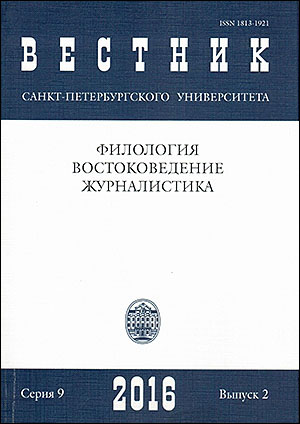Semantic Oppositions as a Peculiarity of Nomination in Bulgarian Dialectic Chrononimy
DOI:
https://doi.org/10.21638/11701/spbu09.2016.212Abstract
The article studies dialectic interpretation of the time notions as a system in the Bulgarian dialects and draws a conclusion that the semantic field of the folk chrononimy in dialects is largely defined through oppositions as a structure of this lexical cluster. Semantic oppositions reflect such peculiarities of dialectic nomination as specific features of the segmentation of extralinguistic reality (a choice of the object of nomination); semantic motivation of nomination (a characteristic feature whereby the name is given), and some others, the use of native words and borrowings in particular. By these specific features the lexemes that define the time with or without starting point, possessing the characteristics of «big» and «small», «male» and «female» are separated from other chrononyms.
Downloads
References
Библиография:
Младенов М. Сл. Българските говори в Румъния. София: Изд-во на Българската Академия на науките, 1993.
Слоўнiк беларускiх гаворак паўночна-заходняй Беларусi i яе пагранiчча: в 5 т. Мiнск: Вышэйшая школа, 1981–1986.
Соболев А. Н. Болгарский широколыкский говор. Синтаксис. Лексика духовной культуры. Тексты. Марбург, 2001.
Стойчев Т. Родопски речник // Българска диалектология V. София, 1970.
Толстая С. М. Семантические категории языка культуры. Очерки по славянской этнолингвистике. М.: URSS, 2010.
Ярославский областной словарь. Учебное пособие: в 10 вып. Ярославль: ЯГПИ им. К.Д. Ушинского, 1981–1991.
Koseska-Toszewa V. Bułgarskie słownictwo meteorologiczne na tle ogólnosłowiańskim. Wrocław–Warszawa–Kraków–Gdańsk, 1972.
Wörterbuch von Mittelfranken. Eine Bestandsaufnahme aus den Erhebungen des Sprachatlas von Mittelfranken. Würzburg: Königshausen&Neumann, 2001.
Bibliography:
Slownik belaruskih gavorak pawnochna-zahodnjaj Belarusi i jae pagranichcha: V 5 t. [In 5 vols.]. Akadjemija Navuk Belaruskaj SSR. Instytut movaznawstva imja Jakuba Kolasa. Мiнск, Navuka i tjehnika Publ., 1979-1986 (in Belarusian)
Mel'nichenko, G. G. (ed.) Yaroslavskiy oblastnoy slovar: In 10 v. [Yaroslavl Dilect Dictionary: In 10 v.]. Yaroslavl, Yaroslavl State Pedagogical Institute Publ., 1981-1991. (in Russian)
Wörterbuch von Mittelfranken. Eine Bestandsaufnahme aus den Erhebungen des Sprachatlas von Mittelfranken[Dictionary of Middle Franconia. A Description of the data in the Atlas of Middle Franconia]. Schunk, G. (ed.). Würzburg, Königshausen und Neumann Publ., 2001. 224 p. (in German)
Koseska-Toszewa, V. Bułgarskie słownictwo meteorologiczne na tle ogólnosłowiańskim [Bulgarian weather vocabulary in the common Slavic background]. Wrocław; Warszawa; Kraków; Gdańsk, Zakład Narodowy im. Ossolińskich Publ., 1972. 136 p.
Mladenov, M. S. Bolgarskite govori v Rumynia [Bulgarian dialects in Romania]. Sofia, Bulgarian Academy of Sciences Publ., 1993. 455 p. (in Bulgarian)
Sobolev, A. N. Bolgarskiy shirokolakskiy govor. Sintaksis. Leksika duhovnoy kultury. Teksty [Bulgarian Shirokolyks dialect: Syntax. Lexis of spiritual culture]. Marburg an der Lahn, Biblion Verl. Publ., 2001. 504 p. (in Russian)
Stoychev, T. Rodopski rechnik [Rodopsk dialect]. - Bulgarian dialectology: Teaching and materials, Sofia, Bulgarian Academy of Sciences, 1970, vol. V, pp. 152-221. (in Bulgarian)
Tolstaya, S. M. Semanticheskiye kategorii yazyka kultury. Ocherki po slavjanskoy etnolinguistike [Semantic categories of the langiage of culture. Essays on the Slavic ethno-linguistics]. Moscow, URSS Publ., 2010. 367 p. (in Russian)
Downloads
Published
How to Cite
Issue
Section
License
Articles of "Vestnik of Saint Petersburg University. Language and Literature" are open access distributed under the terms of the License Agreement with Saint Petersburg State University, which permits to the authors unrestricted distribution and self-archiving free of charge.






